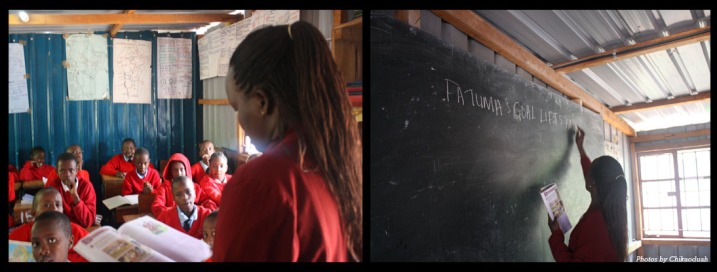I went to a private school in Dagoretti, Nairobi for a series of stories I’m working on about dyslexia in Kenya.
The story will feature as a three part series on one of K24’s news programs. I’m actually excited about doing this because it will give me a chance to do some deep enterprise reporting. I wouldn’t say this is an investigative piece, but it’s enterprise.
A woman named Phyllis took me to the school. I went with K24 camera guy, Leonard. Phyllis founded Dyslexia Organization Kenya a few years ago to promote dyslexia awareness. Her sister is a special education teacher at the primary school that I visited.
Both Phyllis and her sister have sons with dyslexia. In Kenya, the condition is virtually unknown. Many teachers don’t even know about it and students who display dyslexic characteristics are labeled “slow learners.” They are called “mjinga” (stupid in Swahili) and face stigma because in Kenya, as in most African countries, education is highly regarded as the way to success. Parents have a hard time accepting that their child has an actual condition, according to Phyllis.
Phyllis is quite a remarkable woman. She noticed that her son was having extreme difficulty with reading and was lagging behind in his literary development. Among other realizations, Phyllis observed that her son avoided reading and learned that kids and teachers were making fun of him. She knew that something must be wrong and that’s when she started research online. Dyslexia.
She realized that her son displayed all the characteristics of a dyslexic child: retarded reading development, omission and/or reversal of letters when spelling a word, intelligent and creative, very hands-on and active, excels in mathematics. Phyllis learned how to help her son and is working hard to establish the organization starting from the grassroots. I was honored to meet this woman. She’s truly a soldier for her son. She informed her sister that her own son may also be dyslexic since it is a hereditary condition; her sister’s son was also slow in reading. After meeting Phyllis, I met her sister at the school on Day 12 of my reporting at K24.
At the school, I talked with a few boys who display dyslexic characteristics.
Hearing the story of the students who Nancy labels as dyslexic made me proud to be a journalist. I am telling their stories! The three boys I spoke with are in sixth grade, love math, and avoid reading. Interviewing one boy named Stephen, I noticed a big teardrop on the brim of his eyes. It didn’t come out, though. But the shakiness in his voice and the glassy look in his eyes were unmistakable. He said that he confuses “b” with “d.” The second boy said he is frustrated with the classmates who make fun of him. Getting information from the boys was a little difficult. I tried to ask open-ended questions, but they may have been having a hard time understanding my accent.
And of course, Leonard and I caused a ruckus at the school. Once the kids saw the camera and the K24 flag on the mic, they went wild. Sticking their faces out of the windows, shouting and crowding us, those kids really made my day, as kids tend to have that effect on me.
I want to explore if there may be a spiritual rationale behind the denial. I think some parents may “pray against the existence such disorders”, so I’ll do some investigating to find out more on that angle. Many Africans that I speak to abide by the “name it and claim it” concept, so following that logic, if you name or pronounce dyslexia over your child, then you are not only accepting the condition, but you are also actualizing it, or making it your reality. God forbid! That’s what Nigerians would say. Do they say such in Kenya? “Mr.Odinga, your son has dyslexia,” so-and-so says. How does a typical Kenyan parent respond? That’s what I want to find out, without reporting stereotypes and generalizations, of course.
After returning from the school, A fellow reporter asked me to accompany him to cover a press conference with Prime Minister Raila Odinga. The reporter, Ken, is really good at what he does and always looks uber professional.
A delegation of Maasai representatives met with Prime Minister, Raila Odinga to bid him a speedy recovery from the head operation he had last month and to ensure their support for the proposed constitution. The group spokesman for the group said representatives are campaigning throughout Kenya to educate fellow Maasais about the proposed constition. Kenyans are set to vote on the referendum on August 4. Many, including Odinga say a new constitution has long been overdue.
After shaking hands with the Maasai spokesperson, Odinga said he is confident that all forward-thinking Kenyans will vote yes. I couldn’t help but look around Odinga’s beautiful estate. It’s lovely and grand, but it’s not over-the-top.
“The constitution is actually for the liberalization of this country,” Odinga said at the conference. “I know for a fact that all right-thinking Kenyans will vote for this constitution.”








